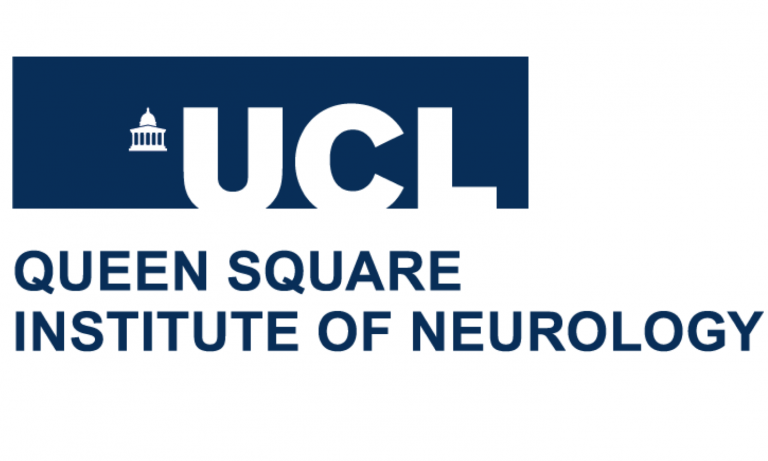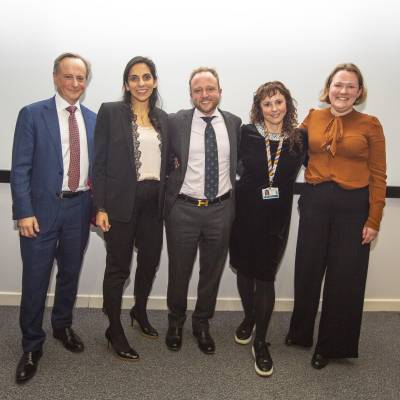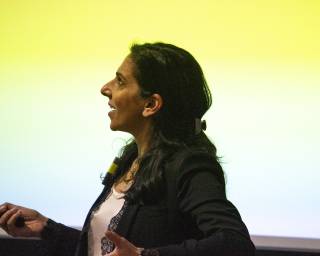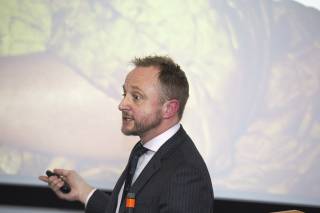UCL Queen Square Institute of Neurology held its third inaugural lecture evening of 2023, on 28th February 2023, which was joined online and in person by many UK and international attendees.

Professor Sonia Gandhi (Professor of Neurology) "In search of the origin of Parkinson's"
Sonia obtained a BA in Neuroscience at Trinity College, University of Cambridge, in 1996, and completed her degree in Medicine at New College, University of Oxford, in 1999. She trained in postgraduate medicine at the Hammersmith Hospital, Royal Brompton Hospital, National Hospital for Neurology and Neurosurgery, and Whittington Hospital. Sonia was awarded a Wellcome Clinical Research Training Fellowship to complete a PhD in Neuroscience at UCL Institute of Neurology in 2004.
In 2007, she trained as a Specialist registrar in Neurology, and took up an NIHR Lectureship in Neurology at Imperial College in 2009. In 2012 she was awarded a Wellcome Trust Intermediate Clinical Fellowship, and established her laboratory at the UCL Institute of Neurology in October 2013. She was awarded a laboratory secondment to the Francis Crick Institute in 2016.
Sonia is a clinician scientist whose research and clinical focus is the study of neurodegenerative diseases. Her laboratory develops disease relevant human cellular models of disease, and studies their pathology utilising dynamic imaging of neuronal and mitochondrial physiology. This approach has enabled the dissection of cellular mechanisms that lead to neuronal death in genetic forms of Parkinson's disease and Amyotrophic Lateral Sclerosis.
The laboratory has an interest in the process of protein aggregation, and how this impacts cellular and organellar dysfunction during disease. In close collaboration with the Department of Chemistry, University of Cambridge, the laboratory applies novel single molecule and super resolution imaging to disease models to investigate how the oligomerisation of proteins alters cellular pathways. A major emphasis of this work is the translation of mechanistic insights in pathogenesis into improved diagnostics, biomarkers, and ultimately novel targets for disease modifying therapy in neurodegeneration.
"Celebrating our promotion to Professor with this set of inaugural lectures by Ed Wild and myself was a pivotal moment – a moment to reflect on the journey I have taken to become a clinical academic, to thank all the mentors and champions who have enabled and supported me, and to share my experiences with family, friends and colleagues. It is such a privilege to work at Queen Square, an exciting and diverse research environment that is home to so much discovery.
My work focusses on understanding the molecular and cellular mechanisms of Parkinson’s, in a search for a cure. Disease modifying therapies for neurodegenerative diseases remain a major challenge in neurology, but working with clinicians and scientists across disciplines and scales, and working with our patients, will help us realise this ambition". Professor Sonia Gandhi
Professor Ed Wild (Professor of Neurology) "Wild type versus mutant"
Edward Wild is a professor of neurology, consultant neurologist at the National Hospital for Neurology and Neurosurgery, Queen Square, and associate director of UCL Huntington’s Disease Centre, where he has been a Principal Investigator since 2015..
He studied medicine at Cambridge University, and has worked in clinical neurology and HD research since 2005. He obtained MRCP in 2005 and specialty certification in 2015. His PhD research on biomarkers and inflammation in HD was undertaken at UCL with Prof Tabrizi, and won the 2009 Queen Square Prize in Neurology.
His team has been central to the discovery and validation of numerous biofluid biomarkers for Huntington’s including mutant huntingtin and neurofilament light proteins and has twice been awarded Huntington Study Group Insight of the Year awards. Ed is the global Chief Investigator of the international HDClarity study, the largest cerebrospinal fluid collection in Huntington’s disease. He is also centrally involved in the design and execution of numerous clinical trial programs including the first antisense oligonucleotide huntingtin-lowering trial (tominersen) and others targeting central mechanisms of Huntington’s disease.
Ed serves on the Medical Advisory Panel of the Huntington’s Disease Association, the Association of British Neurologists Neurogenetics Advisory Panel, and the Translational Neurology Panel of the European Academy of Neurology. He is Associate Editor of the Journal of Huntington’s Disease and co-Lead Facilitator of the European Huntington’s Disease Network’s Biomarkers Working Group.
In 2010, he co-founded HDBuzz, an online source of reliable, impartial, easy-to-understand information about HD research. In recognition of this and his research contributions, Ed was awarded the 2012 Community Leadership Award by the Huntington Society of Canada and the 2014 Research Award by the Huntington’s Disease Society of America.
"I am delighted to have been able to deliver my inaugural lecture in person alongside my friend and colleague Sonia Gandhi, in fulfilment of a promise we made to each other - more in hope than in expectation in my case - ten years ago when we were junior doctors and aspiring academics at the National Hospital for Neurology and Neurosurgery. Our plan was tested first by the covid pandemic and later by the 2022 heatwave, making the occasion even more memorable when it went ahead. The tradition of inaugural lectures and the giants who have delivered them creates a phenomenal legacy of which it is an inestimable honour to have joined.
The focus of my lecture was on the transformative power of patients and scientists working together to imagine a better future and then create it together, as well as the resilience that can come from navigating setbacks and unexpected challenges. I dedicate my lecture, and my remaining career, to the global community of people impacted by Huntington’s disease. It is also a promise not to quit until we have turned HD into something nobody has to worry about". Professor Ed Wild
Introduction and closing remarks were given by Professor Selina Wray, IoN Deputy Director for Partnerships and Communications. Votes of thanks were given by: Professor Tony Schapira (Head of Department of Clinical & Movement Neurosciences, UCL Queen Square Institute of Neurology) and Professor Sarah Tabrizi (Director of Huntington's Disease Centre and co-Head of Department of Neurodegenerative Disease, UCL Queen Square Institute of Neurology) respectively.
Image (left to right): Professor Tony Schapira, Professor Selina Wray, Professor Ed Wild, Professor Sarah Tabrizi, Professor Sonia Gandhi
Links
YouTube Widget Placeholderhttps://www.youtube.com/watch?v=wTMmiHWCPp8


 Close
Close



